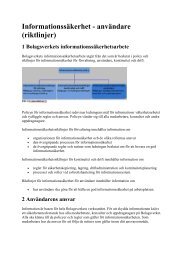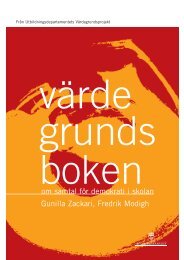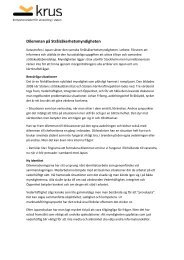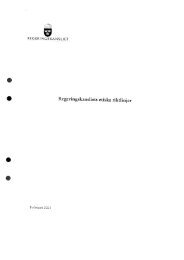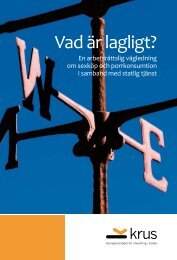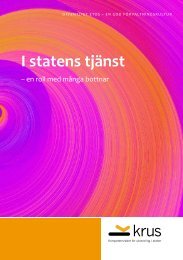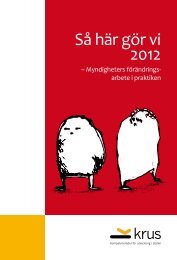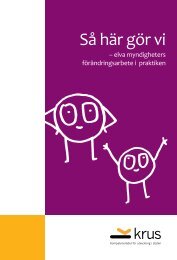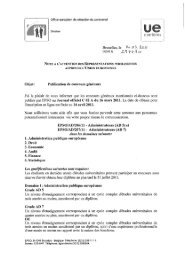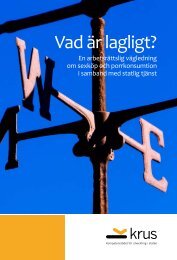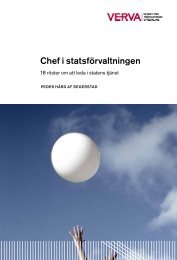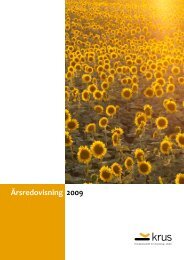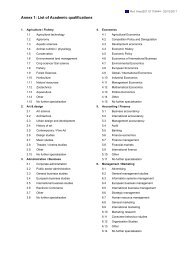Dialogkompetens i skolans vardag - Publikationer - LTU - Luleå ...
Dialogkompetens i skolans vardag - Publikationer - LTU - Luleå ...
Dialogkompetens i skolans vardag - Publikationer - LTU - Luleå ...
Create successful ePaper yourself
Turn your PDF publications into a flip-book with our unique Google optimized e-Paper software.
554 A.-C. Wennergren and K. Rönnerman<br />
always up to the participants themselves to use a tool as an activity or to promote<br />
learning. However, during the period of trying out and developing the ownership of<br />
tools, the facilitator is presented with the challenge of guiding the participants in their<br />
search for different paths in ZPD, as opposed to directing the participants towards<br />
the best path. When teachers take responsibility and assume ownership of school<br />
improvement it has to be a part of the school culture. To be in the ZPD during a<br />
process of school improvement involves an acceptance and understanding of the<br />
school’s culture, since the culture and the process of changes are mutually dependent<br />
upon one another. As discussed earlier, the headteachers’ attitude and participation<br />
is of considerable importance, not only for the school culture, but for the outcome of<br />
the anticipated improvements.<br />
Wells (1999) recounts experiences of using the ZPD in studies concerning learning<br />
among students and teachers. These illustrate that learning in the ZPD changes the<br />
communities of practice since it changes not only the participation, but also transforms<br />
the learner’s identity.<br />
And because individuals and the social world are mutually constitutive of each other,<br />
transformation of the learner also involves transformation of the communities of which he<br />
or she is a member and of the activities in which they engage. (Wells, 1999, p. 331)<br />
By tradition, teachers in classroom situations typically have little faith in the potential<br />
for learning inherent in tackling problems to which no one knows the answer. According<br />
to Wertsch (1998), authentic and open questions, combined with reactions, are<br />
required in dialogues. Authentic questions allow an indeterminate number of acceptable<br />
answers and open the floor to different ideas, whereas a test question allows only<br />
one possible answer and is hence monologic. Outside the classroom, it is often in a situation<br />
that, where no member of the group has a clear idea about how to proceed, many<br />
of the most significant advances in understanding are made. Therefore, it seems that<br />
for learning to occur in the ZPD it is not, according to Vygotsky, essentially a question<br />
of gaining the support of a more capable colleague that is required, but rather a willingness<br />
on the part of the participants to learn with and from one another (Wells, 1999).<br />
Thought has got its origins in the motivating sphere of consciousness, a sphere that<br />
includes our inclinations and needs, our interests and impulses, and our affect and<br />
emotion […] A true and complex understanding of another’s thought becomes possible<br />
only when we discover its real, affective-volitional basis. (Vygotsky, 1987, p. 282)<br />
Bakhtin analyses many aspects of dialogue, a number of which may be of value in<br />
the current context. In Dysthe’s reading of Bakhtin, all understanding is active and<br />
social; I meet myself through others, and the difference between the various voices<br />
constitutes learning potential (Dysthe, 1993). In terms of Bakhtin’s theories, the ZPD<br />
can be described as places where voices and utterances of various individuals are<br />
allowed to evolve into speech. The individuals are taken seriously and are offered<br />
opportunities for confronting views and thoughts with one another. Dialogue is based<br />
on ‘the other’, providing some form of reaction to what has been said and on the<br />
actual driving force being the divergences between the utterances (Bakthin, 1981;<br />
Holquist, 1990).



